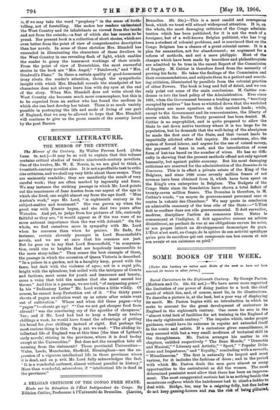C URRENT LITERATURE.
THE MIRROR OF THE CENTURY.
The Mirror of the Century. By Walter Frewen Lord. (John
Lane. 5s. net.)—It may be as well to explain that this volume contains critical studies of twelve nineteenth-century novelists. One of the twelve, Mr. W. E. Norris, is, we are glad to think, a twentieth-century novelist also. It is not a profitable task to criti- cise criticism, and we shall say very little about these essays. They are eminently readable ; they are manifestly the result of very
careful work ; they are often marked by ingenuity and force. We may instance the striking passage in which Mr. Lord points out the remoteness of Jane Austen from one aspect of the age in which she lived, one might almost say from the age itself. "Miss Austen's work," says Mr. Lord, " is eighteenth century in its subject-matter and treatment." She was grown up when the great war with France began, and she died two years after Waterloo. And yet, to judge from her pictures of life, curiously faithful as they are, "it would appear as if the war were of no more national importance than the war with Ashanti." On the whole, we find ourselves more in sympathy with Mr. Lord when he censures than when he praises. He finds, for instance, certain slovenly passages in Lord Beaconsfield's novels, and we see at once that his censures are just. But he goes on to say that Lord Beaconsfield, " in compensa- tion, could rise to heights that are hopelessly inaccessible to the mere story-teller." Then comes the best example of these, the passage in which the accession of Queen Victoria is described. "In a palace in a garden, not in a haughty keep, proud with the fame, but dark with the violence of ages ; not in a regal pile, bright with the splendour, but soiled with the intrigues of Courts and factions, meet scene for youth and innocence and beauty, came a voice that told the maiden that she must ascend her throne." And this is a passage, we are told, " of surpassing grace." In his " Dedicatory Letter" Mr. Lord writes a little wildly. Of course, he cannot keep Protection out of it. " For thirty years shouts of pagan exultation went up as estate after estate went out of cultivation." Where and when did these pagan—why "pagan" ?—shouts go up? " ' Can we not get cheaper food from abroad ? ' was the convincing cry of the apostles of cheapness.' Yes ; and if Mr. Lord had had to keep a family on twelve shillings a week, he would have found the advantage of getting his bread for four shillings instead of eight. But perhaps the most curious thing is this. On p. xxi. we read : " The abiding in- tellectual life of England was at this time [the time of Lytton's early novels] stirring in the provinces, where it is dead to-day except at the Universities." But does not the exception take all meaning from the statement? These provincial Universities— Wales, Leeds, Manchester, Sheffield, Birmingham—are the ex- pression of a vigorous intellectual life in these provinces where it is dead, and on p. xvii. Mr. Lord fully acknowledges the fact. " It is a wonderful outburst, almost without parallel in history." More than wonderful, miraculous, if " intellectual life is dead in the provinces."










































 Previous page
Previous page